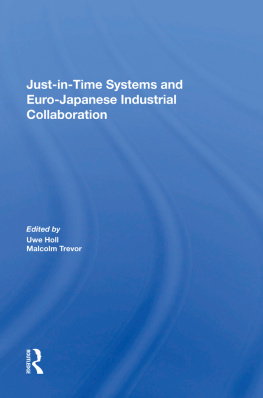Malcolm Trevor - Just in Time Systems and Euro-Japanese Industrial Collaboration
Here you can read online Malcolm Trevor - Just in Time Systems and Euro-Japanese Industrial Collaboration full text of the book (entire story) in english for free. Download pdf and epub, get meaning, cover and reviews about this ebook. year: 2019, publisher: Routledge, genre: Home and family. Description of the work, (preface) as well as reviews are available. Best literature library LitArk.com created for fans of good reading and offers a wide selection of genres:
Romance novel
Science fiction
Adventure
Detective
Science
History
Home and family
Prose
Art
Politics
Computer
Non-fiction
Religion
Business
Children
Humor
Choose a favorite category and find really read worthwhile books. Enjoy immersion in the world of imagination, feel the emotions of the characters or learn something new for yourself, make an fascinating discovery.
- Book:Just in Time Systems and Euro-Japanese Industrial Collaboration
- Author:
- Publisher:Routledge
- Genre:
- Year:2019
- Rating:4 / 5
- Favourites:Add to favourites
- Your mark:
- 80
- 1
- 2
- 3
- 4
- 5
Just in Time Systems and Euro-Japanese Industrial Collaboration: summary, description and annotation
We offer to read an annotation, description, summary or preface (depends on what the author of the book "Just in Time Systems and Euro-Japanese Industrial Collaboration" wrote himself). If you haven't found the necessary information about the book — write in the comments, we will try to find it.
Malcolm Trevor: author's other books
Who wrote Just in Time Systems and Euro-Japanese Industrial Collaboration? Find out the surname, the name of the author of the book and a list of all author's works by series.
Just in Time Systems and Euro-Japanese Industrial Collaboration — read online for free the complete book (whole text) full work
Below is the text of the book, divided by pages. System saving the place of the last page read, allows you to conveniently read the book "Just in Time Systems and Euro-Japanese Industrial Collaboration" online for free, without having to search again every time where you left off. Put a bookmark, and you can go to the page where you finished reading at any time.
Font size:
Interval:
Bookmark:

52 Vanderbilt Avenue, New York, NY 10017
2 Park Square, Milton Park, Abingdon, Oxon OX14 4RN
Product or corporate names may be trademarks or registered trademarks, and are used only for identification and explanation without intent to infringe.
Just in time systems and Euro-Japanese industrial collaboration.
1. Production control. 2. Inventory control.
I. Trevor, Malcolm, 1932- . II. Holl, Uwe.
TS 157 J87 1988 658.5 88-17100
CIP-Titelaufnahme der Deutschen Bibliothek
Just-in-time systems and Euro-Japanese industrial
collaboration / Uwe Holl; Malcolm Trevor, ed. - Frankfurt am
Main: Campus Verlag; Boulder, Colorado: Westview Press,
1988
ISBN 3-593-33970-6 (Campus) kart.
ISBN 0-8133-0729-5 (Westview Press) kart.
NE: Holl, Uwe [Hrsg.]
- Appendix I:
Application of Just-in-Time Manufacturing Techniques in the United Kingdom - Appendix II:
Chairmen, Speakers and Panel
- Appendix I:
Application of Just-in-Time Manufacturing Techniques in the United Kingdom - Appendix II:
Chairmen, Speakers and Panel
- Appendix I:
Application of Just-in-Time Manufacturing Techniques in the United Kingdom - Appendix II:
Chairmen, Speakers and Panel
Font size:
Interval:
Bookmark:
Similar books «Just in Time Systems and Euro-Japanese Industrial Collaboration»
Look at similar books to Just in Time Systems and Euro-Japanese Industrial Collaboration. We have selected literature similar in name and meaning in the hope of providing readers with more options to find new, interesting, not yet read works.
Discussion, reviews of the book Just in Time Systems and Euro-Japanese Industrial Collaboration and just readers' own opinions. Leave your comments, write what you think about the work, its meaning or the main characters. Specify what exactly you liked and what you didn't like, and why you think so.












